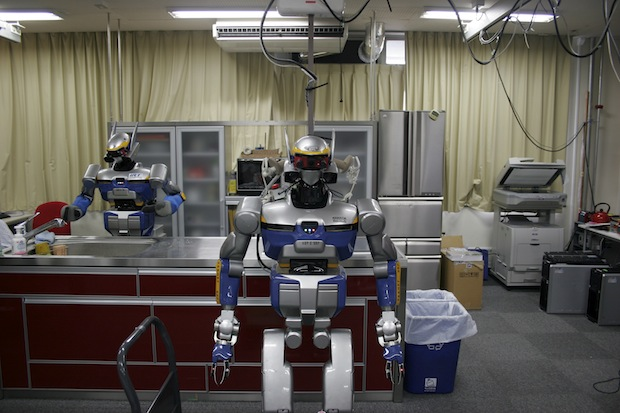
HRP-2 robots learn kitchen chores at the University of Tokyo's JSK Lab.
Google has recently been in the news for its buying spree of robotics companies. Many people are excited about this and believe that this will greatly accelerate robotics technology development and hopefully make robots ubiquitous in our lives. I hope that's true, and if so, the big question is: When will we be able to buy robots to help us with household chores?
In a simplistic sense, the home robot market can be divided into three categories: (1) robots helping with dull and tedious household chores; (2) robots taking on new roles in homes (e.g., education, entertainment, companionship); and (3) robots in assisted living communities. Each of these markets has different underlying economics. In this post, I will focus on the first category.
So can we expect to see robots helping us at home anytime soon? Before answering this question, let me quickly summarize the societal implications of home robots assisting us with household chores. Here are my predictions:
- Home robots might save many marriages by reducing fights over household chores. I am sure that divorce lawyers will hate home robots!
- Teens will have love-hate relationship with robots. Because robots are doing most of the work at home, parents won’t need to nag teens to help out around the house. But at the same time teens won’t get money from their parents for doing chores, as is common today in many U.S. families. Cash-deprived teens will need to cut down on money they spend on music and movies. This might be bad for certain pop stars (watch out Justin Bieber, home robots won't be good for your album sales).
- Home robots will dethrone pet animals from being the stars of viral YouTube videos. They might even spawn new reality shows on TV to depict new relationship dynamics at homes as robots join the family.
- Call centers with human workers will be needed to bail out robots in distress. Hopefully, this will create new jobs for humans. Perhaps auto clubs like AAA can start new robot clubs to assist robot owners.
- People won’t have any sense of privacy inside their homes. Robots will be able to monitor your every move, so be careful of what you do at home. I am sure NSA folks will be very happy with the advent of home robots. They will finally have the ability to know what time you take showers. They already know everything else!
- Occasionally, home robots will be involved in accidents. I can already see insurance companies salivating at this new opportunity. Hopefully, your robot can answer the phone when telemarketers from insurance company call you to sell new robot insurance policies.
Here is a partial list of chores performed inside homes that can benefit from robot assistants:
- Help with laundry
- Load and unload dishwashers
- Do preparatory work for cooking meals (e.g., chopping vegetables)
- Clean kitchen
- Clean toilets and bathtubs
- Pick up objects (e.g., toys, newspaper, clothes, sneakers) from the floor and move them to the right location
- Unload groceries from the car parked in garage
- Assemble furniture
- Help with moving heavy objects
- Answer phone when telemarketers call at dinner time
The above list does not include tasks for which the robot will have to venture outside the home. For example, I did not include lawn maintenance and snow cleaning tasks. A robot working outside the home will need to be able to deal with a wide variety of weather conditions and safety issues. This is a lot harder problem to solve.
I also purposefully did not include pet sitting and baby sitting in the above list. Some people believe that robots should be able to do these. I think that this will be a good idea for TV shows, but a terrible idea in real-life.
A home robot will require significant in-home installation, regular monitoring, and servicing to keep it operational. You may need to robot-proof your home to make sure that the robot does not damage your home and your home does not damage your robot.
I think we should look at a leasing or renting model instead of a buying model. In this model, people will rent the robot from a company for a monthly fee. The company will take care of the installation, monitoring, and servicing. If the robot is stuck, it should be able to contact a call center. Hopefully, someone in the call center should be able to teleoperate it to get out of the jam.
So how much people are willing to pay in monthly fees for robots at home? Based on preliminary estimates, I expect people will be willing to pay $200 to $500 per month to rent a robotic assistant for the home. I believe that people will be willing to pay $5 to $10 per hour of labor saved. So if a robot can save 40 hours of tedious chores per month, then people will be willing to pay $200 to $400 per month for the robot.
Let us assume that a well-designed robot will have a service life of five years. So the home robot market looks a lot like automobile market from pricing and service life points of view.
In order for robots to be able to do 40 hours’ worth of useful chores in homes, a lot of new technology will need to be developed. I believe that this technology can be sold at $200 per month if there were a few million customers. So here is the catch: unless there is a large market, the desired robots cannot be offered at the right price. However, unless the useful technology is available at the right price, the large market simply won’t exist!
Unfortunately, incremental development of home robot technology and its introduction in markets will be extremely slow. We will need to meet or exceed 40 hours per month of useful robotic chores at home to create a significant home market and associated infrastructure. In my opinion, realizing a home robot is technologically feasible (as shown in the images below), but it will require billions of dollars of investment in technology development to ensure the high level of reliability and safety needed for home use. What's more, venture capitalists don’t like these kinds of markets. My hope is that cash-rich companies such as Google, Microsoft, Apple, and others will go after developing this technology and create a new industry.
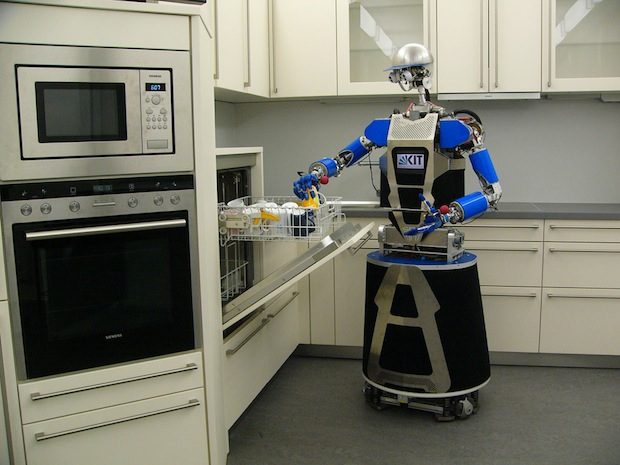
ARMAR, created at the Karlsruhe Institute for Technology, learns not just from previously stored instructions but also from reaching out and touching things. Photo: KIT
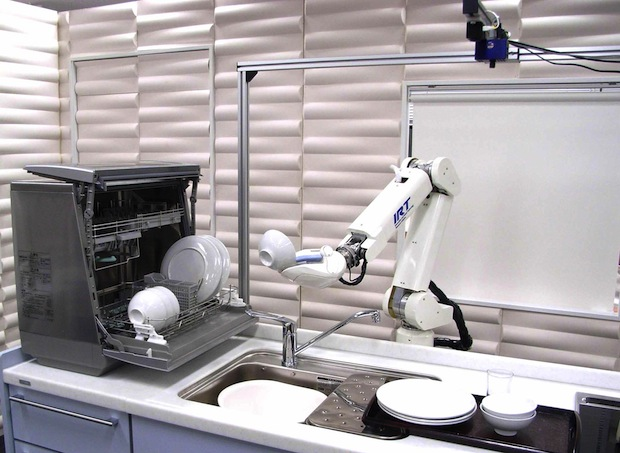
The Kitchen Assist Robot (KAR), developed at the University of Tokyo's JSK Lab, can load and unload a dishwasher. Photo: JSK Lab
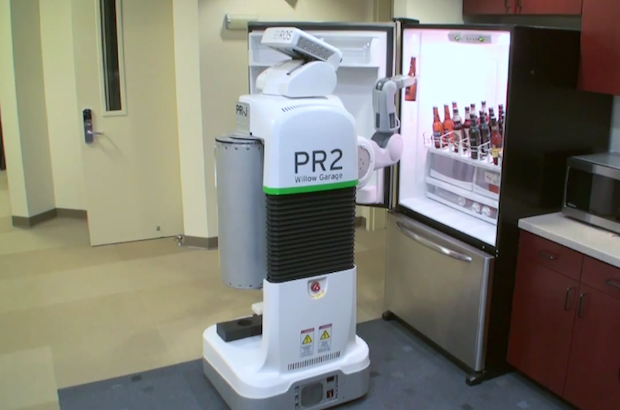
Willow Garage researchers programmed a PR2 robot to fetch drinks from a refrigerator. Photo: Willow Garage
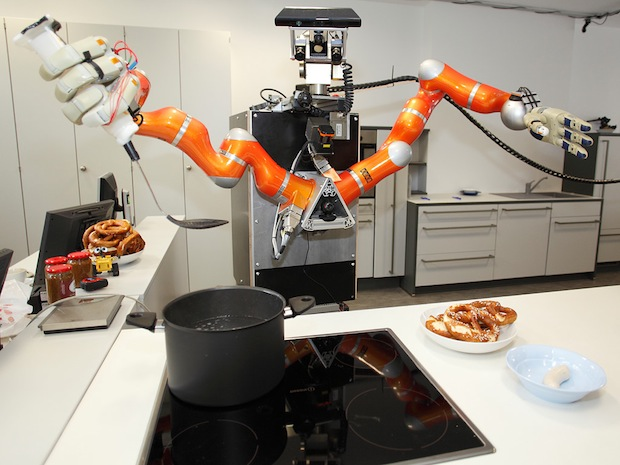
Rosie, a robot built at the Technical University Munich (TUM), prepares a typical Bavarian breakfast. Photo: TUM
Cell phones were invented for people to talk, but they have found new roles such as music players, Web browsers, email clients, cameras, gaming devices, and so forth. The revenue growth in the cell phone market was possible because of the new roles played by the devices.
I believe that the same thing is likely to happen for home robots. Initially people will be interested in getting robots at home to help with specifics household chores, but soon they will find new uses for these robots. Moreover, I believe that robots might find an easier path to become popular in people’s homes by adopting new roles such as personal trainers, entertainers, and tutors (say, music instructor, golf instructor).
So, when will we be able to buy robots to help us with household chores? If some of the tech giants mentioned above—or any other company flush with cash—decide to go after this technology, then we might have these robots before the end of this decade. Otherwise, we may need to wait for a while. What is your prediction?





